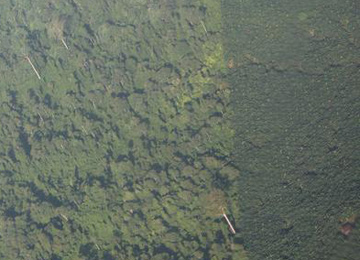Deal on forests falls short
Rhett A. Butler, mongabay.com
December 11, 2008
|
|
A deal reached Wednesday in Poznan to include forests in future climate treaties is a positive step but falls short of the progress needed to get the REDD (reducing emissions from deforestation and degradation) mechanism on track for incorporation into the framework that will succeed the Kyoto Protocol, say environmentalists speaking from the talks.
The Poznan agreement recognizes the importance of forests in mitigating climate change and acknowledges the need for participation of forest-dependent peoples in developing forest conservation initiatives. It also commits the UNFCCC Secretariat to "organize an expert meeting before Copenhagen, to discuss reference emission levels for deforestation and forest degradation" and prepare a technical paper on the cost of assessing carbon stocks, monitoring deforestation, and implementation REDD projects. The resolution is otherwise disappointing to some conservationists who had hoped the conference would lay a stronger groundwork for REDD.
"Hopes were not fulfilled on REDD," Fred Boltz, Vice President of Conservation Strategies at Conservation International (CI), told mongabay.com. "Although important efforts and modest progress were made on critical issues such as the need to ensure the effective participation of indigenous people and local communities, further financing and capacity building for government readiness and key methodological issues, the UNFCCC did not reach a decision on REDD in Poznan. A decision would have been an important milestone demonstrating global commitment and progress on inclusion of a REDD policy decision in Copenhagen next December."
 Without proper provisions — to be discussed at talks scheduled early next year — could the agreement have the potential to usher in carbon credits for converting peatlands to industrial oil palm plantations? |
In particular, the Poznan resolution fails to take a strong position on protecting biodiversity. It refers to "co-benefits" but Boltz says the statement "is much weaker than we would like." The agreement also fails to explicitly mention "indigenous rights" or the UN Declaration on the Rights of Indigenous Peoples — points that indigenous rights advocates have been rallying around leading up to, and throughout, the conference.
Other groups are concerned that the agreement does not effectively include other carbon-rich ecosystems like peatlands — the destruction and degradation of which are a huge source of greenhouse gas emissions (up to 2 billion tons of CO2 in some years).
"The working group on the methodologies for Reducing Emissions from Deforestation and Degradation (REDD) has decided to only deal with above ground biomass, ignoring carbon rich soils," said Wetlands International, an environmental NGO, in a statement. "This decision will… ignore or even worsen the emissions of 2 billion metric tons per year from peatland loss in developing countries."
Wetlands says that ignoring soil carbon could lead to the draining and conversion of peatlands for eucalyptus plantations established to generate carbon credits through reforestation. Net CO2 emissions would increase but project developers would be paid nonetheless. Similar fears apply to degraded (i.e. logged) forests, which could be cleared and replanted with industrial plantations in the name of reforestation. Such plantations could qualify for carbon credits if their above ground biomass could be shown to be greater than that of the degraded forest. More perversely, there remains the possibility that a focus on "net" emissions from deforestation could allow a country could offset the clearing of virgin forest by establishing plantations. On these grounds a coalition of environmental and indigenous rights groups are pushing to change the U.N.'s definition of "forests" under REDD to exclude plantations.
|
|
"Plantations are not forests," said the Global Forest Coalition in a statement released at Poznan. "Forests are diverse ecosystems and plantations are void of biodiversity."
A stronger clause on biodiversity ("co-benefits") would also help address this concern.
The weakness of the overall agreement is the product of a long-running and intense political battle over the inclusion of forestry in a international framework on climate. Still despite its shortcomings, Boltz of CI says the "window is open to craft a stronger commitment".
"This is a disappointing outcome, but we retain optimism on the important recognition of indigenous peoples and local communities, technical progress and the growing convergence of all nations on commitment to a robust Copenhagen outcome."
"We took one step forward," wrote Jake Schmidt, international climate policy director at Natural Resources Defense Council (NRDC), on his blog. "This is a positive step forward as we will now be able to get down to the "nitty gritty" details on the deforestation debate."
